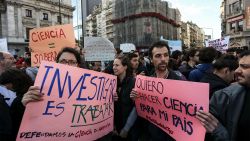Argentina’s scientists engulfed in budget crisis
 Scientists in Argentina are bracing for hard times next year. Later this month, the country’s senate is expected to approve a 2017 budget that would deal a crippling blow to research. Researchers and students have been staging protests in the capital, Buenos Aires, and in other cities since news of the pending cuts broke last month.
Scientists in Argentina are bracing for hard times next year. Later this month, the country’s senate is expected to approve a 2017 budget that would deal a crippling blow to research. Researchers and students have been staging protests in the capital, Buenos Aires, and in other cities since news of the pending cuts broke last month.
“The message is clear: Science is not a priority to this government,” says Cecilia Kramar, an Argentinian postdoc studying neuroscience at the University of Western Ontario in London. “There won’t be new science in Argentina because there won’t be new scientists to do it.”
When Argentine President Mauricio Macri took office in December 2015, he vowed to double the share of spending on science and technology in the government’s budget from 0.7% to 1.5%. But that promise has collided with an economic downturn that is driving up the nation’s debt. As part of its plan for balancing its books, the government intends to cut the science and technology budget by $198 million, to $2.1 billion in 2017—an 8.5% decrease.
Belt-tightening will be felt especially severely at the National Scientific and Technical Research Council (CONICET), which will have to devote 96% of its $655 million budget next year to salaries for researchers and scholars. That leaves a mere $26 million for research projects, lab equipment, and scholarships. (In 2014, CONICET spent $77 million—31% of its budget that year—on items other than salaries.) Argentina’s young Ph.D. scientists and postdocs rely on CONICET stipends as a bridge to tenure-track positions in academia or other career paths. Young researchers now on stipends are expected to be OK. But “it is not clear whether [CONICET] will have the sufficient funds to open new positions,” warns Jorge Aliaga, a physicist and former dean of the Faculty of Exact and Natural Sciences at the University of Buenos Aires. That could cast many young researchers adrift.
For that reason, Aliaga and others worry that the expected cuts will spark an exodus of young scientific talent. Argentina has experienced brain drains before—most recently in the early 2000s, when the country’s economy was in a severe recession. “Whole packs of young people just left,” Aliaga says.
Echoing that concern is Franco Bonafé, a Ph.D, student who is studying quantum dynamics at the National University of Córdoba. In 2013, he turned down a chance to enroll in a Ph.D. program at the University of Texas in Austin. “I said, ‘I’ll take a chance here in Argentina,’” he recalls. But the cuts have cast a shadow over his future. If the outlook for science here remains bleak, he says, “I will have no chance whatsoever to become the chemist that I want to be.”
Kramar, meanwhile, is one of almost 7000 Argentinian scientists now living outside of the country, according to the science ministry. It has always been her plan to return to Argentina. “I’m not changing my mind,” she says. “But even if I shout and kick, [the government] will be shutting the doors on me. I won’t be able to return home.”
Fuente: www.sciencemag.org

